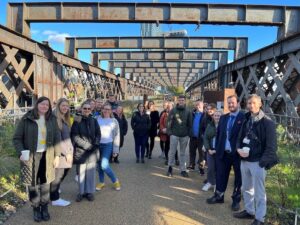Building better worlds
 The University’s Science and Engineering Education Research and Innovation Hub (SEERIH) is a nationally recognised hub for teacher development. Through several innovative and research informed projects and programmes, SEERIH engages and develops teachers to ensure high-quality learning outcomes for young people across Greater Manchester and on a national scale.
The University’s Science and Engineering Education Research and Innovation Hub (SEERIH) is a nationally recognised hub for teacher development. Through several innovative and research informed projects and programmes, SEERIH engages and develops teachers to ensure high-quality learning outcomes for young people across Greater Manchester and on a national scale.
One of the projects in which SEERIH engages with Greater Manchester primary schools is through a collaboration with the Royal Society. SEERIH recruits local primary schools to take part in a 2-year programme, comprising of several professional development opportunities for their teachers.
The success of the school Great Clean Air Challenge resulted in 23 Greater Manchester primary schools supported over 2 years by SEERIH. With the aim to increase teacher and pupil confidence when working as scientists, this programme linked schools with industry and academic scientists and engineers, who worked with pupils and teachers through science investigations aligned to real scientific research projects. The programme resulted in 10 schools being awarded £3,000 through the Royal Society Partnership Grant Scheme.
In 2023, SEERIH launched the ‘Building Better Worlds’ programme extending the reach to another 25 primary schools. With a similar model of professional development and scientist engagement, teachers and pupils are supported to improve mainstream teaching of working scientifically linked to real-world contexts. Biodiversity, the built environment and the UN Sustainable Development Goals underpin the project. SEERIH provides the specialist support to identify how contemporary practices to enhance biodiversity in urban areas can be inspiration for school projects aligned to core curriculum objectives. Castlefield Viaduct provided a perfect setting for an immersive teacher learning experience in November 2023.
British Science Week in March 2024 will be the stimulus for scientists and engineers actively supporting pupils to gather data about biodiversity in their school grounds. The impact will be recognised when pupils communicate their learning as part of the Great Science Share for Schools on 11 June 2024. Teachers taking part in the programme have recognised the impact their involvement has had on their confidence in engaging their pupils in real-life contexts when teaching the statutory curriculum for science. They reported that having in-person visits from STEM professionals has meant that their pupils have been able to make connections between their learning in school and its relevance to their lives. Pupils have also had their aspirations widened and an increased awareness of the varied work taking place within the University of Manchester and the local industries represented.
We look forward to supporting these schools to submit Royal Society Partnership Grant proposals which will see hundreds of children having sustained and meaningful experiences with science and scientists over the next few years.
